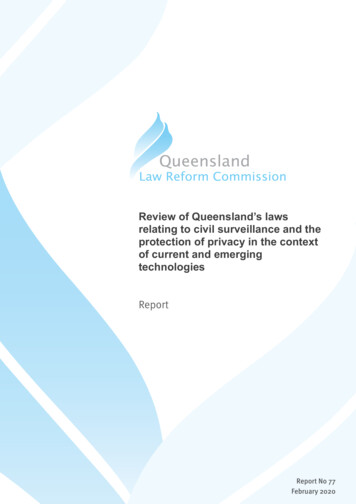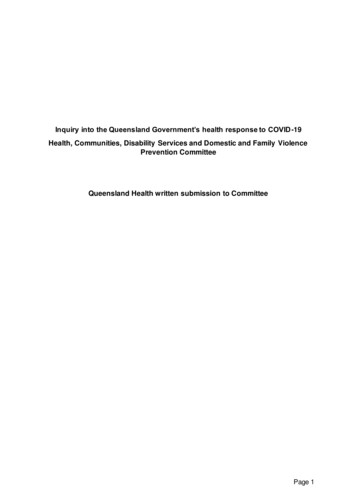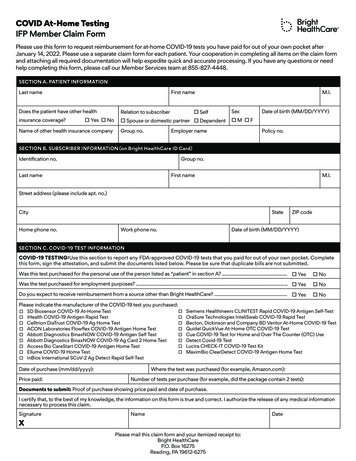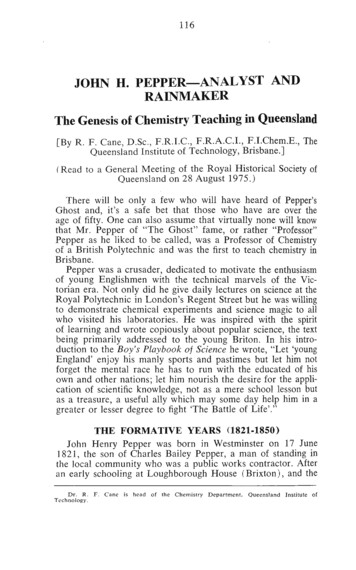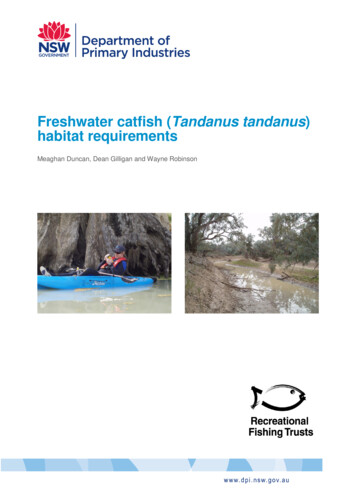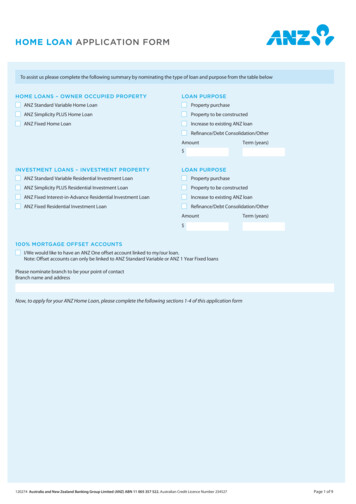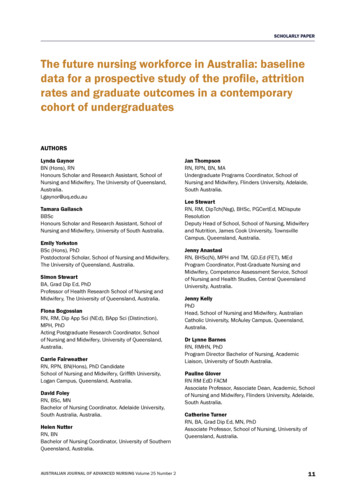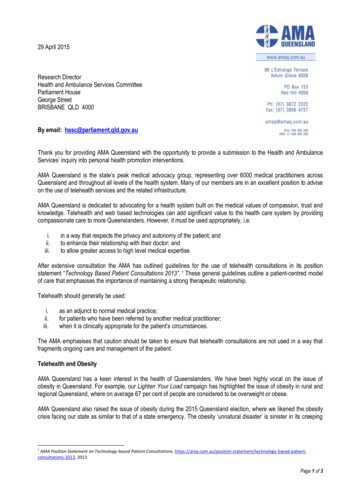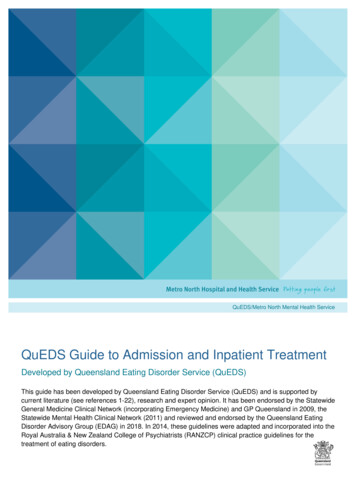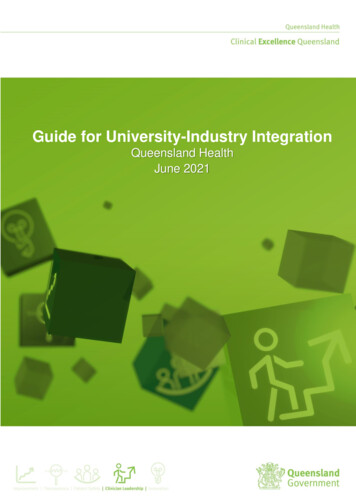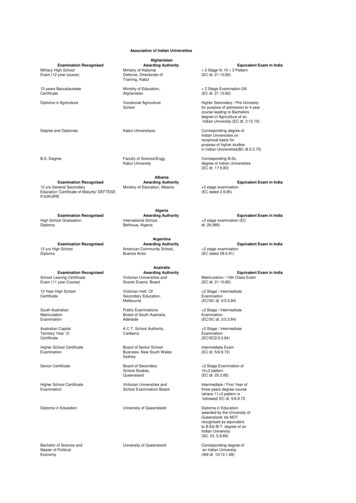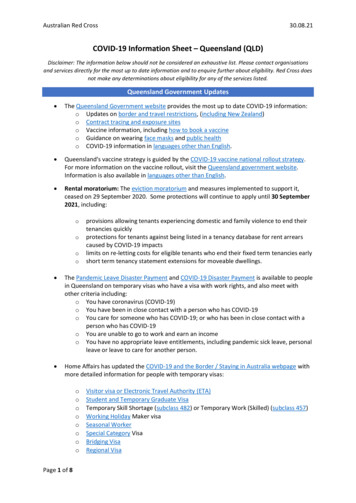
Transcription
Australian Red Cross30.08.21COVID-19 Information Sheet – Queensland (QLD)Disclaimer: The information below should not be considered an exhaustive list. Please contact organisationsand services directly for the most up to date information and to enquire further about eligibility. Red Cross doesnot make any determinations about eligibility for any of the services listed.Queensland Government Updates The Queensland Government website provides the most up to date COVID-19 information:o Updates on border and travel restrictions, (including New Zealand)o Contract tracing and exposure siteso Vaccine information, including how to book a vaccineo Guidance on wearing face masks and public healtho COVID-19 information in languages other than English. Queensland's vaccine strategy is guided by the COVID-19 vaccine national rollout strategy.For more information on the vaccine rollout, visit the Queensland government website.Information is also available in languages other than English. Rental moratorium: The eviction moratorium and measures implemented to support it,ceased on 29 September 2020. Some protections will continue to apply until 30 September2021, including:ooooprovisions allowing tenants experiencing domestic and family violence to end theirtenancies quicklyprotections for tenants against being listed in a tenancy database for rent arrearscaused by COVID-19 impactslimits on re-letting costs for eligible tenants who end their fixed term tenancies earlyshort term tenancy statement extensions for moveable dwellings. The Pandemic Leave Disaster Payment and COVID-19 Disaster Payment is available to peoplein Queensland on temporary visas who have a visa with work rights, and also meet withother criteria including:o You have coronavirus (COVID-19)o You have been in close contact with a person who has COVID-19o You care for someone who has COVID-19; or who has been in close contact with aperson who has COVID-19o You are unable to go to work and earn an incomeo You have no appropriate leave entitlements, including pandemic sick leave, personalleave or leave to care for another person. Home Affairs has updated the COVID-19 and the Border / Staying in Australia webpage withmore detailed information for people with temporary visas:ooooooooPage 1 of 8Visitor visa or Electronic Travel Authority (ETA)Student and Temporary Graduate VisaTemporary Skill Shortage (subclass 482) or Temporary Work (Skilled) (subclass 457)Working Holiday Maker visaSeasonal WorkerSpecial Category VisaBridging VisaRegional Visa
Australian Red Crosso30.08.21My visa has expiredFrom September 2020, concessions have been made for certain visa holders impacted by thepandemic. These concessions help if you have been disadvantaged by border closures,business restrictions or the economic downturn. If you hold, or held, a visa listed belowduring the COVID-19 concession period you may be eligible:oooooSkilled Regional (Subclass 887) visaBusiness Innovation and Investment (Permanent)(Subclass 888) visaBusiness Innovation and Investment (Provisional)(Subclass 188) visaSafe Haven Enterprise (Subclass 790) visaTemporary Graduate (Subclass 485) visaFor information on the Temporary Activity Visa (subclass 408) visit the Home Affairs website.How to stay COVID safe With the relaxing of restrictions, and opening of state and some international borders,Australian governments are encouraging everyone to remain COVID safe.Physical distancingo When and where possible, remain 1.5 metres away from other people.o Avoid physical greetings such as handshaking, hugs and kisses.o Take extra care if you are using public transport.o Avoid crowds and large public gatherings.o Wear a mask when in public.Workplaces & schoolso Follow the recommended government health and hygiene advice.o Avoid non-essential face-to-face meetings.o Provide alcohol-based hand rub for all staff.o Eat lunch at your desk or outside rather than in the lunchroom.o Regularly clean and disinfect surfaces that many people touch.o Open windows or adjust air conditioning for more ventilation.o Stay at home if you are feeling unwell.Employment & Work Rights From 01 May 2021, if you relocate to take up ongoing work, including an apprenticeship, formore than 20 hours a week for more than six months, you may be eligible to receive up to:ooo 3,000 if you relocate to a capital city* 6,000 if you relocate to a regional areaAn extra 3,000 if you relocate with a dependent.For more information on Relocation Assistance, visit the Australian Government’sDepartment of Education, Skills & Employment website here. Temporary relaxation of working hours for student visa holdersDue to exceptional circumstances during the COVID-19 pandemic and the need to ensurethe supply of critical services, the Department of Home Affairs and Australian Border ForcePage 2 of 8
Australian Red Cross30.08.21will take a flexible approach to student visa holders working beyond their usual worklimitations, but only in specified industries.You can work more than 40 hours a fortnight if you are:oooemployed by an aged care Approved Provider or Commonwealth-funded aged careservice provider with a RACS ID or a NAPS ID, before 8 September 2020employed by a registered National Disability Insurance Scheme providerenrolled in a health care related course and you are supporting the health effort againstCOVID-19, as directed by health officials.You cannot work more than 40 hours if you are employed in a supermarket.All workers in Australia have the same rights and protections at work, regardless of citizenship orvisa status. Your employer must comply with Australian workplace and immigration laws, includingtheir obligation to: Pay you the right pay rate for all time workedProvide a safe workplace.For information on working in Australia visit the Home Affairs website.The Fair Work Ombudsman provides education, assistance, advice and guidance to employers andemployees, and can inquire into and investigate breaches of the Fair Work Act.Food and/or Emergency Relief AskIzzy is a national database with links to supports including housing, food and clothing,health services, financial support, family violence assistance, and much more. The National Debt Helpline provides free financial advice, and the NDH website hasinformation on topics such as rent, utilities and emergency financial assistance. The NDH isopen Monday to Friday from 9:30am – 4:30pm, on 1800 007 007. Support for people in self-isolation or quarantine – 1800 173 349 (advice, information andsupport, or to arrange delivery of essential food or medication.)ooooooSt Vincent de Paul Helpline: 1800 846 643Anglicare Southern Queensland: 1300 114 397Wesley Mission’s Brisbane Relief Hub: 1300 541 625SALVOS Connect: 1300 371 288Access Community Services: (07) 3412 8222 (option 4)Monday – Friday, 1pm – 4pm (no citizenship or residency requirements)Romero Centre, 8 Dutton St, Dutton Park (07) 3013 0100 – (by appointment only).Supports people seeking asylum with emergency relief and case management.Online directories: Oneplace is an online service directory for Queenslanders looking for support, ranging fromfood relief, domestic and family violence support, homelessness support and much more.The Queensland Government has an interactive map for their Emergency Relief Program,which provides financial and/or material support to people in financial crisis.Page 3 of 8
Australian Red Cross 30.08.21The Department of Social Services directory also has a list of current emergency relief grantsavailable throughout Queensland.OzHarvest food rescue and delivery vans are collecting and delivering food in certainlocations throughout Queensland. Visit the website for more information.New Zealand community groupsNew Zealand citizens living in Australia may be able to access a range of payments, depending ontheir visa conditions and individual circumstances. There are many organisations in Queenslandworking with New Zealanders living in Australia. Queensland Maori Society: Providing cultural and spiritual support for Maori people living inQueensland. Contact Tu Tawpa (0455 094 964) or visit the website for more information. Nerang Neighbourhood Centre: Multiple programs & activities including a food service;information, advice, referrals and support; information and advice for New Zealand citizensliving in Australia; air conditioned room and office facilities; wireless and internet access;coffee and tea facilities. Phone (07) 5578 2457 for more information. The Koha Shed: A Queensland based registered charity organisation open to all race, colourand creed. Offering many services within the homeless, domestic violence support,disadvantaged youth support, training courses, indigenous support and mental healtharenas throughout Australia. Refer to https://www.facebook.com/thekohashed. Oz Kiwi: A community support group, advocacy regarding New Zealander rights and accessto Australian supports/ services. Helpful information regarding citizenship, PR and SCVpathways. Refer to: http://www.ozkiwi2001.org/. Queensland Community Care: QCC offer support to people who live permanently inQueensland, regardless of visa status. Visit the website for more information. Aiga Samoa: Language & culture programs, located in Deception Bay. Pasifika Families: Language & cultural programs. Playgroups for under 5’s, and run theannual Pasifika Vibes event, https://www.facebook.com/PasifikaFamilies Ako ako Ki Piripani: Maori community organisation, focused on language & cultural support,as well as running annual Redcliffe Waitangi Day event, 328537943/ Community Action for Multicultural Society (CMAS): Run from Caboolture NeighbourhoodCentre. Contact Luisa Miller (cams@caboolturenhc.com.au or 5432 4220) for informationon programs, including food vouchers or links to other services for help.Rent and Utilities Rental moratorium: The eviction moratorium and measures implemented to support it,ceased on 29 September 2020. Some protections will continue to apply until 30 September2021, including:Page 4 of 8
Australian Red Crossoooo30.08.21provisions allowing tenants experiencing domestic and family violence to end theirtenancies quicklyprotections for tenants against being listed in a tenancy database for rent arrearscaused by COVID-19 impactslimits on re-letting costs for eligible tenants who end their fixed term tenancies earlyshort term tenancy statement extensions for moveable dwellings. For support with tenancy matters contact Tenancy Queensland on 1300 744 263. TheTenancy Queensland website also has a number of factsheets and links to forms. Residential Tenancy Authority of QLD: General information available in communitylanguages here. The QLD Government COVID-19 Residential Rental Hub provides information about rentingduring COVID-19 and an information hotline 1800 497 161 – Monday to Friday (8am to 8pm)and from 9am-5pm Saturday and Sunday. Electricity and Gas Rebate QLD: To apply for the rebate, you will need to contact yourenergy provider to start the application. Water and Energy Bills: The Queensland government will be providing up to 200 credit forall Queensland householders to offset the cost of water and electricity.Housing / Homelessness QLD Homelessness Hotline is a statewide referral service for those at risk or experiencinghomelessness. 1800 474 753 (24 hour service) Uniting Care run homelessness services in Gold Coast providing:o Emergency accommodation for those over 18 yearso Support and referral for young peopleo Crisis intervention, counselling and emotional supporto Training on living skills, budgeting skills and financial managemento Practical assistance and advocacyHealth and Medical Care Queensland Health Coronavirus Advice Line: 13 43 25. The QLD Health website providesreliable health information for refugees and asylum seekers, more information here. World Wellness Group has a free Multicultural Connect Phone Line (1300 079 020) for thoseaffected by Covid-19. The service is open to people of all ages and backgrounds, regardlessof visa status. WWG also offers free mental health support for people on temporary visas.Referral forms and more information is available by contacting WWG on (07) 3333 2100. The Immigrant Women’s Support Service is open to support people with experience ofsexual assault and family violence. An emergency relief hotline (07) 3846 0316 operates onTuesday and Thursdays from 9:00am – 12:00pm. General enquiries on (07) 3846 3490.Page 5 of 8
Australian Red Cross30.08.21 What if I don’t have Medicare? Most people who are ineligible for Medicare will have healthor travel insurance. If you do not have adequate insurance and are ineligible for Medicareyou will not be charged out of pocket expenses if you present to any Queensland Healthfacility for assessment and treatment in relation to COVID-19. The Queensland Government provides Medicare ineligible asylum seekers with access topublic health services at no charge. See: Refugee and Asylum Seeker Health Services and theRefugee Health Network webpage. The Refugee Health Guide includes Refugee Health Programs staffed by refugee nurses,doctors and other specialists that operate nationally - providing specialised mental andprimary health care and service coordination to refugees and people seeking asylum.Information on referral pathways in Queensland are found here. Reciprocal Health Care Agreements: Agreements with 11 countries that cover the cost ofnecessary care when Australians visit certain countries and visitors from these countriesvisit Australia. Those visiting from the following countries may be eligible for medical careunder Medicare while in Australia, information for each country is available here. Temporary Visa Categories Covered by Ministerial Orders (eligible for Medicare) To support older people from culturally diverse backgrounds, the Australian Department ofHealth has funded the Multilingual Older Persons COVID-19 Support Line. The support linewill run for six months from 10 February 2021 until 31 July 2021 will be offered in thefollowing six languages – Arabic, Cantonese, Mandarin, Greek, Italian & Vietnamese. Formore information visit the PICAC Alliance website.Information for the LGBTQI community Information on health and counselling services, social groups, legal support, multiculturalspecific services, and other services can be found on this national LGBTQI directory. The Queensland Rainbow Hub is a free space to support and empower internationalLGBTQI students and friends in Queensland: https://www.facebook.com/QLDrainbowhub/Information for International Students in QLD The Queensland Government provides a range of support services and resources tointernational students, including a network of online and physical Student Hubs and the24/7 hotline – 1800 778 839. If you are experiencing hardship as a result of COVID-19, youare encouraged to book an appointment through the online Queensland Student Hub via thewebsite: Student Support Qld Student Hub. If your education or training provider is not onthis list, please check with your provider’s student support team directly. University of Queensland has frequent COVID-19 updates on its website, including studentspecific information. Financial hardship information is also available. Griffith University is providing interest free student loans and other financial support to helpwith the cost of education and living expenses. Eligible students can apply for a loan of up toPage 6 of 8
Australian Red Cross30.08.21 1,000 to be repaid within six months for international students. Other information,including the return to campus plan is available on the website. James Cook University has established a food pantry in Cairns and Townsville to helpstudents with necessities, and has other student support options. University of Southern Queensland: For a list of supports available, visit the USQ website. Southern Cross University website provides general COVID-19 information and advice forstudents. If you need to contact the University because your situation is affected by theCOVID-19 outbreak please use this dedicated email: SCUAssist@scu.edu.au.Information for New Zealanders living in AustraliaNew Zealand citizens in Australia on a Special Category Visa (SCV) may be able to access a range ofpayments, depending on their circumstances.oThose who came to Australia prior to 26 February 2001 generally have protectedstatus and have the same access to all Australian payments as permanent residentsand Australian citizens, where eligible, including JobSeeker Payment.oNew Zealanders who came to Australia after 26 February 2001 and havenon-protected status can access family payments, such as FTB, paid parental leavepayments and childcare subsidy, where eligible. If they have been continuously livingin Australia for at least 10 years since February 2001, they can also access JobSeekerPayment or Youth Allowance for a one-off period of up to six months.oNew Zealanders on an SCV may be eligible for the JobKeeper Payment if they meetthe qualifying criteria, https://treasury.gov.au/coronavirus/jobkeeper.oNew Zealand citizens may also be able to claim the Age Pension or, in limitedcircumstances, Disability Support Pension or Carer Payment, under the SocialSecurity Agreement between Australia and New Zealand. For further general ndividuals/subjects/payments-visa-holders Individuals needing specific advice on their circumstances should contact Services ividuals/contact-usAdditional Information for People Seeking Asylum and Refugees If you have a Temporary Protection Visa (TPV) or Safe Haven Enterprise Visa (SHEV), you areeligible to apply for the Special Benefit payment. Click the link for more information. The Refugee and Immigration Legal Services (RAILS) have produced a fact sheet for peopleon SHEVs and TPVs addressing special benefits, superannuation, and other information. Asylum Seeker and Refugee Assistance Program. The program is a limited term grant by theState Government supporting the needs of people seeking asylum. The project deliversfinancial and material aid, and case management. For more information, contact the RedCross MSP QLD HUB: 07 3367 5665 or 0433 940 653 or email: qldmsphub@redcross.org.au.Page 7 of 8
Australian Red Cross30.08.21 Status Resolution Support Services: The SRSS program supports people who are waiting for adecision on a visa application, including people seeking asylum. It provides temporarysupport for people facing significant barriers who are unable to support themselves.o In Queensland, SRSS is delivered by: Multicultural Australia – Ph: 3337 5400o ACCESS Community Services – Ph: 3412 8222 Humanitarian Settlement Program: HSP is a national program funded by the AustralianGovernment to help refugees to establish themselves when they first arrive in Australia.ooooPage 8 of 8People granted the following visas are eligible to access the HSP on arrival:- Refugee (subclass 200, 201, 203 and 204) visa- Global Special Humanitarian (subclass 202) visaOther visa holders are also eligible to access the HSP, but only to receive Specialisedand Intensive Services (SIS). These include:- Protection (subclass 866)- Temporary Protection (subclass 785), Temporary Humanitarian Stay (subclass449), Temporary Humanitarian Concern (subclass 786) and SHEV (subclass 790).SIS is a component of the Humanitarian Settlement Program (HSP) available tohumanitarian entrants and other eligible visa holders who have complex needs.HSP Service Provider Locations.
If you hold, or held, a visa listed below during the COVID-19 concession period you may be eligible: o Skilled Regional (Subclass 887) visa o Business Innovation and Investment (Permanent)(Subclass 888) visa o Business Innovation and Investment (Provisional)(Subclass 188) visa o Safe Haven Enterprise (Subclass 790) visa
